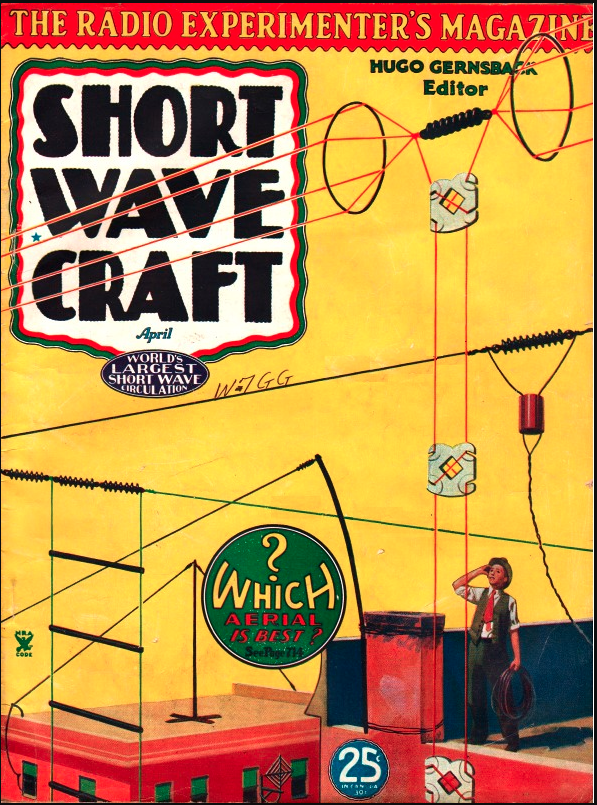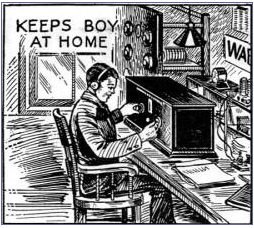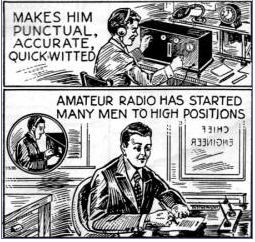In the spirit of upcoming Fathers Day we would like to share some excerpts from an
article published in the April 1935 edition of Popular Electronics magazine entitled,
“Why Your Son Should Learn Radio”.

The author John T. Frye (W9EGV) explains how this skill and the use of critical thinking and hand-eye coordination will help keep a young person occupied and off the streets and indeed out of pool halls!
Interestingly, the article is written by a ham operator, who has been mentoring Jack, a schoolboy. The young boy’s father does not understand this sudden indoor isolated hobby and indeed has an aversion to the activity, but the author explains just how useful it is for the boy to be engaged in amateur radio..
His first point centered around the fact that it is not too costly. Back then in 1935 the author says “In the first place, let us take the matter of cost. You say that it will cost too much. Do you know that my first radio station, including both transmitter and receiver, was built for less than five dollars? Yet, with that little station, I consistently talked with other amateurs a thousand miles away! Surely, you do not consider five dollars an exorbitant price to pay for a year’s entertainment and instruction.”
He mentions seeing two boys walk into the drugstore, one picks up a shortwave ham mag and flick through it whilst the other looks around carefully and then stuffs a less savoury magazine up his shirt.
He ads “ If amateur radio can give Jack something to keep his mind occupied, it will do him a service of incalculable value.”


His next point with bolded letters is “Ham Radio Keeps a boy at home”
He starts by reminding the intended reader (Jacks dad) that when your boy is home he is under your influence and watchful eye. Whereas you dont know what might influence Jack without supervision. In his words: “There are too many boys who regard the family home as merely a sort of refuelling and rest station!. Where kids come home to eat, have a rest and go out again. Instead such a hobby will keep your son home.
The fact that evenings are the best times for radio operations is most advantageous that your boy is at home with this hobby most evenings, rather than out after dark frequenting pool halls and hanging around on the streets!
His next bold heading is Teaches Responsibility.
“Amateur radio is a good teacher” The amateur must be licensed by the Federal Government, and therefore needs to observe and abide by rules laid out by these regulators of radio.
In addition “traffic handling” is a great lesson in itself, as it requires the radio amateur to keep schedules and pass messages requiring punctuality, precision and accuracy.
He follows by saying: ‘One of the first things that Jack will learn is that he must use his head and his hands if he is going to do anything in the amateur radio game. Of the fifty thousand amateurs in the United States, no two of them are confronted with exactly the same problems. Radio, (as does any modern science), demands the ability to reason clearly and logically. The building of a receiver, the ironing out of the “bugs” in a transmitter, and the erection of a good antenna are literally “hotbeds” of problems in radio theory. These problems must be met and conquered by a combination of theoretical knowledge and clean, sharp reasoning!
Once the problems of theory are solved, the amateur is confronted by new problems of actual construction. He knows that his station will have to undergo the most exacting scrutiny at the hands of fellow amateurs, and he wishes to make it as neat, as convenient, and as efficient as it lies in his power to make it. In other words, his skill as a workman is “challenged”, and I could take you on a tour of amateur stations that would convince you how marvelously some amateurs meet this challenge!”
There are several more points in this article, the next is the boldly headlined Short-Wave Radio Creates “Objective!”
Amateur Radio provides a challenge, a concrete objective to work towards. There is nothing more beneficial than working towards and achieving a goal. He followed this by explaining: “it teaches him to expend the fruits of his labours wisely and carefully. I know a particular case of a boy who refused to work at any of the tasks that are usually conditional to supplying a boy with “pocket money.” Distributing newspapers, running errands, selling magazines, and all other suggestions left him unenthusiastic.
Then he became interested in “radio”! At once, his character underwent a marvelous change. He threw off his lethargy and became one of the most “industrious” boys in the town.”
So indeed a keen interest and a goal will keep a child’s brain focussed and active!
The article continues with several more points we will reveal in Part 2 next week of our Fathers Day articles, one of our favourite lines from next week is “no danger of your son becoming a radio nut”! This point talks about radio nuts and how this boy in question “Jack” need not worry about becoming a nut.
Tune in to our blog next week for the follow up to this article. In the meantime, can you think of a person who could benefit from learning the art of amateur radio? It could be a family member young or old or perhaps one of the kids in your area.
Kids these days have a lot on their plate and more than ever face distractions from video games and social media. Radio could in fact be the perfect solution!









